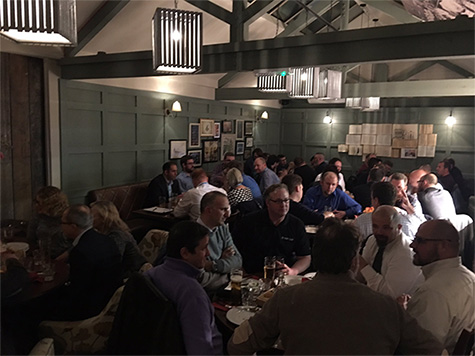There were more than 20 Experience API (xAPI) vendors at the Learning Technologies Conference and Exhibition this month in London. As far as I know, this event is the biggest learning technology conference in Europe, and the over 7,500 attendees came from all over the EU and beyond.
The clear growth in the number of worldwide xAPI vendors shows that the specification is steadily gaining adoption. As an exhibitor, I asked nearly every professional I spoke to, “Do you know about the xAPI specification?” Often the answer was “no.” However, I have been asking that question at conferences for the past three years and I am definitely getting more “yeses” at every conference we attend. As much as some of us are living and breathing xAPI daily, xAPI is still in the early adoption phase—but it’s gaining by leaps and bounds.
London is a dense and busy place with much to do, but the siren song of xAPI and free beer made for an excellent post-conference xAPI event on February 1. The sold-out London xAPI Barcamp packed the reserved meeting space of the Britannia Pub in Kensington (Figure 1) with almost 60 people. The Britannia is a fantastic traditional pub with cask-conditioned “real ale” and all the UK pub menu fixings, like haggis and Scotch egg. The event was expertly organized and run by Martin Cousins of LearnPatch fame. Martin was the local-to-London coordinator who put it all together.

Figure 1: The Britannia Pub, Kensington, scene of the London xAPI Barcamp
The 1.5-hour round-robin format Martin presided over had each of the speakers seated at a table with 8 to 12 attendees for 10 to 12 minutes. Speakers then moved clockwise to the next table and repeated their presentations until all tables had conversations with each of the speakers. It was kind of like speed dating for xAPI, and it worked! The conversation could be anything xAPI. Martin served as timekeeper; he would stand on a table, tapping his glass and kindly asserting, “OK, excellent, we must keep the speakers moving along … shut it! Time to move on now.” I think I laughed out loud each time we switched tables. The challenge was that after 10 minutes of conversation, everyone’s attention was fully engaged and Martin had his hands full with the task of getting us all to stop the immediate conversation and get on to the next.

Figure 2: The Barcamp in session
Common conversation threads
Here are the key themes that I took away from the Barcamp:
- xAPI is still in early adoption, but interest is growing and it is becoming more sophisticated. Conversations are happening around the xAPI/learning record store (LRS) use case with forward-thinking people who know what is possible and know what they want for their organizations.
- The interest from the market is growing, and key case studies are coming online to build interest and trust from those on the fence about moving into the future with xAPI.
- The lack of adoption still seems to be tied to an “older guard” in L&D that is less interested in change and/or technology. During one of my table conversations, an attendee stated the LMS industry enjoys telling customers what they can and cannot do.
- Interest at the Learning Technologies Conference and the London Barcamp reinforced that xAPI can help solve real challenges and bridge gaps between legacy technology and new technology for learning science and pedagogies.
One attendee noted that the different xAPI-expert speakers rotating from table to table all had their unique angle or lens on xAPI and the challenges, opportunities, etc., they are facing. Yet they still did not hear any repetitive points or conflicting positions.
The speakers
The list of speakers participating in the Barcamp was a veritable who’s who in xAPI today, most of whom are commercial LRS vendors. It really is hard to go wrong when you get a group of passionately committed professionals in a room and provide free beer and appetizers. Overall, the feedback was that it was great to hear from a broad group of seven different xAPI practitioners on their view of the specification and the current state of the business and industry adoption. These were the speakers:
- Aaron E. Silvers, designer, technologist, and strategist (@aaronesilvers). Aaron helped develop SCORM, and he led and guided xAPI to 1.0 release.
- Ben Betts, CEO, HT2 (@bbetts). HT2 creates learning and performance software that changes the way businesses and individuals experience learning.
- Luke Hickey, CEO, DominKnow (@dominKnow). DominKnow is a learning company that builds software and training solutions.
- Margaret Roth, chief business development officer, Yet Analytics (@margaret_h_r). Yet Analytics builds xAPI/LRS experiential data technologies for human-capital analytics.
- Mike Rustici, CEO and founder, Watershed (@mikerustici). Watershed LRS and services provide expertise in eLearning conformance as well as learning and development analytics.
- Nick Washburn (me), director, learning division, Riptide Software (@RiptideLearning). Riptide Elements’ product line helps customers provide smarter learning and analytics.
- Tim Martin, CEO, Rustici Software (@timpmartin). Rustici Software is the leading provider of products and services to assist with xAPI and SCORM conformance.
Update on DISC (Data Interoperability Standards Consortium)
Aaron Silvers is the president and executive director of DISC, and he provided a DISC statement for this article:
“With xAPI’s growing, global adoption and its uses across governments, militaries, healthcare providers, and higher education institutions, it is critical that this open and transparent approach to working with data continues to grow and mature. Being in the UK for the LT conference … highlighted just how broad and international the xAPI community is, with stakeholders, practitioners, and vendors wanting to work together and tackle big challenges. DISC members such as HT2 Labs, Riptide Software, and Yet Analytics are champions of xAPI’s growth, and I could not be more thankful to be able to count on them as partners in the important work we’re undertaking together to grow the community and continue to make xAPI easier to work with to deliver better insights, built on reliable data.”



